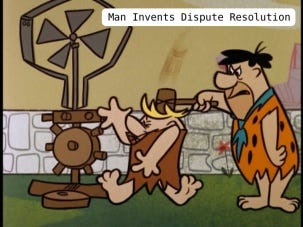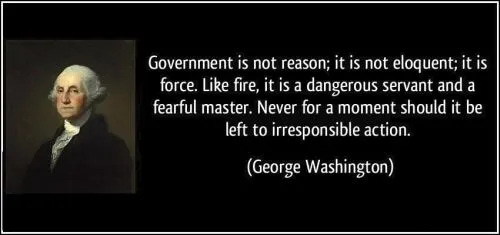A government is more than just an organization of people. If you define government in terms of a state, one definition is “the system by which a state is legitimately controlled”. But what is a state? What is control? What is “legitimate”? This seems to be yet another situation where the dictionary didn’t quite put a full ass into its work.
The idea that a government is defined by a monopoly on force (ie violence) dates back to the late 1500s and 1600s in writings by Jean Bodin and Thomas Hobbes, but was explicitly solidified by Max Weber in 1919. Weber defined a state as a “community that successfully claims the monopoly of the legitimate use of physical force within a given territory.”
This works pretty well for traditional sovereign nations with clear territorial boundaries. But this definition falls apart where large governments are made up of smaller governments or in regions with poorly defined boundaries or rival factions. But its not the monopoly on violence that is what defines government, but when that violence is used methodically to implement policy.
So I’m going to define a government in a rather different way: A government is a group of people able to enforce policies through the credible threat of force.
This definition doesn’t require clear boundaries and doesn’t rely on the nebulous concept of legitimacy. It works for city governments as separate entities from national governments and also works to define some unusual things as governments, like criminal and terrorist organizations. As I’ll talk about in a later post, this unusual classification can be useful and illuminating.
The credible threat of force is the ability that separates a government from a business or other organization. A government has the ability to fine, imprison, or punish people, whether the people in its jurisdiction like it or not. The government of a ruthless tyrant is no less a government if his people consider him illegitimate.
Origins of Government
Pretty much everyone agrees that some government is beneficial. Despite popular opinion, most libertarians also agree that some government is desirable, and perhaps surprisingly, even many of those who call themselves anarchists believe that a very minimal government has its place.
Thomas Hobbes believed that humans in their natural state live in terror and chaos. Hobbes believed laws and their enforcement can tame this chaos and reduce the terror of natural life. Jean-Jacques Rousseau, on the other hand, believed that humans in their natural state are independent and peaceful, and that technology and government introduce chaos and terror into our lives. I believe they’re both right. Government, as I have defined it above, is both the source of terror and the solution.
But few people talk about government as the inevitability it is. Put any group of people together in an isolated situation, and a government will just pop in there. This happens because of disputes – one person claiming that another harmed them in some way, or disagreement as to what the group should do. Everyone has disagreements with others that aren’t sufficiently solved by social pressures. Or in some cases, social pressures themselves are the problem (for example, racial prejudice in the US).
Dispute resolution to prevent harm is at the root of why government is not only necessary, but inevitable. So the question is not whether we should have government or not, but how do we ensure the governments we do have are good? The structures of government that follow from dispute resolution lead to methods of directing resources toward benefiting the collective, rather than just resolving internal disputes. Things like protection from outside forces and government services.
But these methods can also direct resources in ways that benefit only part of the collective. The status and power that comes for the controller of a collective’s resources also drives the creation and expansion of governments. The resources of a group can be an attractive prize for the shrewd politician or strong warlord. And often the service of dispute resolution is a source of legitimacy, since a consistent source of dispute resolution, no matter how unfair, can bring a certain level of prosperity to a community even in oppressive regimes, as is well demonstrated by Daron Acemoglu and James Robinson in their analyses of weak vs strong states.
When it comes right down to it, violence and imprisonment have historically been very effective ways of getting people to do what you want, especially when a majority (or even a large minority) legitimizes those actions. Monopolizing violence naturally occurs as stronger factions absorb or eliminate weaker ones.
The Whole Gamut: The dimensions of government
Governments are creations of people, and as such they will always be imperfect. I’ll spend a post discussing the spectrum of government, mostly so we can dismiss most governments as awful and then focus on the good parts of the spectrum. We should look behind us briefly before heading over the next hill.
For now, I’ll summarize that there are two important ways to look at a government: the legal structure of the government and the social environment that government operates in.
A government’s legal structure has six major attributes:
Number of leaders – Autocracy vs Direct Democracy
Amount of representation – Monarchy vs Republic
Separation of powers – Single Branch vs Multiple Branches
Limitation of powers – Totalitarian vs Libertarian
Level of agreement – Majority vs Unanimity
Coupling of sub-governments – Loose vs Tight
With these six attributes you can classify the structure of any government and even treat the world as a whole as a single government with very very loosely coupled sub-governments (which can be interesting when compared to smaller government made of loosely coupled parts).
There is of course much more to the government of a nation than its legal structure. The social environment, I mentioned, is incredibly important in understanding how a jurisdiction’s economy and government operate. The social organizations, political alliances, cultural values, laws, and legal precedent are all both shaped by the government’s structure and also shape the behavior of a given government. Two governments with the same constitutions will be significantly different if the cultures and political environments are significantly different. I might talk about these things in a later post as they related to inclusive and exclusive institutions, socialism, and the feasibility of governmental change. But for now, I’ll leave it there.
An upcoming post will go into a bit of detail about the six attributes of a government’s legal structure and how they affect a society.







The goal of government is to solve game-theoretical problems in real-life: https://thewaywardaxolotl.blogspot.com/2014/07/game-theory-and-society.html